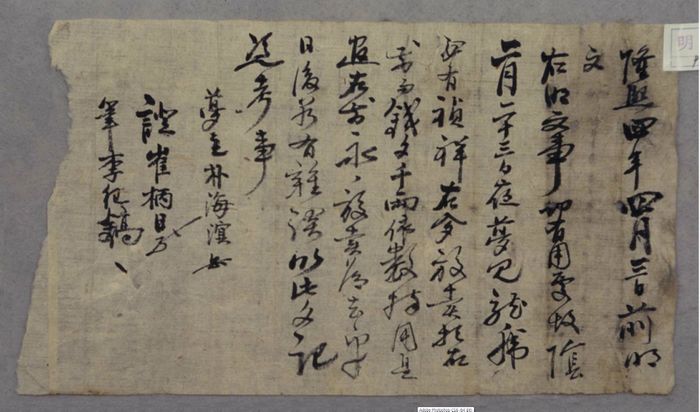(Translation) 1910年 朴海溟 賣夢明文
| Primary Source | ||
|---|---|---|
 |
Title | |
| English | A Document of Selling a Dream | |
| Chinese | 1910年 朴海溟 賣夢明文 | |
| Korean(RR) | 1910년 박해명 매몽명문(Pak Haemyŏng Maemongmyeongmun) | |
| Text Details | ||
| Genre | Social Life and Economic Strategies | |
| Type | Record | |
| Author(s) | 朴海溟 | |
| Year | 1910 | |
| Source | ||
| Key Concepts | Trading | |
| Translation Info | ||
| Translator(s) | Participants of 2017 Summer Hanmun Workshop (Advanced Translation Group) | |
| Editor(s) | ||
| Year | 2017 | |
목차
- 1 Introduction
- 2 Original Script
- 3 Translation
- 3.1 Student 1 : (Irina)
- 3.2 Student 2 : (Write your name)
- 3.3 Student 3 : (Masha)
- 3.4 Student 4 : (Jong Woo Park)
- 3.5 Student 5 : (Kanghun Ahn)
- 3.6 Student 6 : (Write your name)
- 3.7 Student 7 : King Kwong Wong
- 3.8 Student 8 : (Write your name)
- 3.9 Student 9 : Martin
- 3.10 Student 10 : (Write your name)
- 3.11 Student 11 : (Write your name)
- 3.12 Student 12 : (Lidan Liu)
- 3.13 Student 13 : (Write your name)
- 3.14 Student 14 : (Write your name)
- 4 Further Readings
Introduction
Original Script
| Classical Chinese | English |
|---|---|
|
隆熙四年四月三日前明文 右明文事 切有用處故 陰 二月二十三日夜夢見龍虎 必有禎祥 右夢放賣於右 前 而錢文千兩依數捧用是 遣 右前永永放賣爲去乎 日後若有雜談 以此文記 憑考事 夢主朴海溟 證崔柄日 筆李紀鎬 |
(translation) |
Translation
Student 1 : (Irina)
- Discussion Questions:
In Korea faith in auspicious dreams has a long tradition and this tradition is still alive. Which are the dreams regarded most auspicious in modern Korea?
Student 2 : (Write your name)
- Discussion Questions:
Student 3 : (Masha)
- Discussion Questions:
1. What is the significance of dreaming about dragons and tigers? Why it was considered auspicious? What did they stand for?
2. Could the date of the dream be of any significance?
3. What does it tell us about the spread of bureaucratization and commodification at the time where even dreams could become part of a contract agreement?
Student 4 : (Jong Woo Park)
- Discussion Questions:
Chosŏn government often tries to control and "rectify" the so-called evil custom. Was there any governmental interference in the transaction of dream?
Student 5 : (Kanghun Ahn)
1. If they sold their dreams based on contract, was there any standard as to measuring the value of them?
2. Koreans seem to have a long-standing tradition of selling one's dreams to others, which is still being passed down on to this day. What are some of the factors that make it possible? And is it something unique only in Korean culture?
Student 6 : (Write your name)
- Discussion Questions:
Student 7 : King Kwong Wong
- Discussion Questions:
- What does this document tell us about the legal practice of commercial activities in the late Choson period? How does it different or not different from previous period?
- Why would a person sell his/her dream? And why would one buy it? What does the practice of selling dream tell us about the religious and social aspect of Choson society?
Student 8 : (Write your name)
- Discussion Questions:
Student 9 : Martin
- Discussion Questions:
1. What is the historical significance of Dragon-Tiger dreams? What does it stand for and why is it considered auspicious?
Student 10 : (Write your name)
- Discussion Questions:
Student 11 : (Write your name)
- Discussion Questions:
Student 12 : (Lidan Liu)
- Discussion Questions:
1. Since dream is intangible, how can people verify whether the seller actually had an auspicious dream? Couldn't someone simply make up dream to make money? 2. Does this dream selling activity have any support from any religion or local believes?
Student 13 : (Write your name)
- Discussion Questions:
Student 14 : (Write your name)
- Discussion Questions: 1) Did joseon people generally believe that they could buy and sell dreams? 2) Why do you think this document does not bear the name of the person who buys the dream? 3) Let's say someone bought this dream, what roles would this document have played?